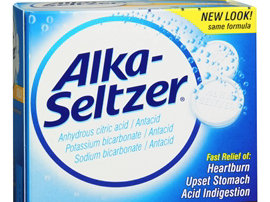Aspirin: Does Over-the-Counter (OTC) mean without serious health risks?

Last Updated on June 7, 2016 by Joseph Gut – thasso
June 07, 2016 – Does over-the-counter (OTC) mean without serious health risks? As we can learn from a recent drug safety communication by the American Food & Drug Administration (FDA) on Over-the-Counter (OTC) antacid products containing aspirin, which are associated with serious bleeding risks, this question is definitively not to answered with yes. Quite to the contrary: The FDA is warning consumers about the risk of serious bleeding when using OTC products containing aspirin to treat heartburn, sour stomach, acid indigestion, or upset stomach. In reality, these widely used OTC-products already contain warnings about this bleeding risk on their labels; however,  FDA is continuing to receive reports of this serious safety issue. In the US, the respective OTC-antacid products containing aspirin are sold under various trade names, including Alka-Seltzer Original, Bromo Seltzer, Medique Medi Seltzer, Picot Plus Effervescent, Vida Mia Pain Relief, Winco Foods Effervescent Antacid and Pain Relief, and Zee-Seltzer Antacid and Pain Reliever. They are also available as generic products.
FDA is continuing to receive reports of this serious safety issue. In the US, the respective OTC-antacid products containing aspirin are sold under various trade names, including Alka-Seltzer Original, Bromo Seltzer, Medique Medi Seltzer, Picot Plus Effervescent, Vida Mia Pain Relief, Winco Foods Effervescent Antacid and Pain Relief, and Zee-Seltzer Antacid and Pain Reliever. They are also available as generic products.
In 2009, a warning about the risk of serious bleeding was added to the labels of all OTC products that contain NSAIDs, including aspirin-containing antacid products. However, since then, a search of the FDA Adverse Event Reporting System (FAERS) database identified eight cases of serious bleeding events associated with these products after the warning was added. All of these patients were hospitalized. Patients had underlying conditions such as the risk factors above that put them at greater risk for developing serious bleeding events (see Data Summary). The FAERS database includes only reports submitted to FDA so there are likely additional cases about which FDA is unaware.
Consumers should always read the drug label carefully when purchasing or taking an OTC product to treat heartburn, acid indigestion, or sour or upset stomach. If the product contains aspirin, consider whether you should choose a product without aspirin to relieve your symptoms. Aspirin is a commonly used pain reducer and fever reducer. It is a nonsteroidal anti-inflammatory drug (NSAID) that can increase the risk of bleeding, including in the stomach and gastrointestinal (GI) tract.
If you have one or more of the following risk factors, you may have a higher chance of serious bleeding when taking aspirin-containing antacid products:
- Are 60 years or older
- Have a history of stomach ulcers or bleeding problems
- Take a blood-thinning or steroid medicine
- Take other medicines containing NSAIDs such as ibuprofen or naproxen
- Drink three or more alcoholic drinks every day
Taking more of these medicines than the amount recommended or for a longer period than recommended will increase the risk of serious bleeding. Healthcare professionals and patients are encouraged to report adverse events or side effects related to the use of these products, in the US, to the FDA’s MedWatch Safety Information and Adverse Event Reporting Program online at www.fda.gov/MedWatch/report or by downloading the form or calling 1-800-332-1088 to request a reporting form, then complete and return to the address on the pre-addressed form, or submit by fax to 1-800-FDA-0178. Customers outside the US should contact their local pharmacovigilance-reporting or health authority.

